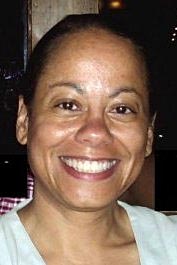|  |  | |  |

|  |  |  |  |  | An Interview with Myrna Hutcherson
|
02.19.04
|

|
|
Myrna Hutcherson |
Ever since she was a little kid, Myrna Hutcherson has been asking questions. That curiosity is finally paying off. Hutcherson, a meteorology student at Diablo Valley College in Pleasant Hill, Ca., was selected last year for the NASA-sponsored Minorities Striving and Pursuing Higher Degrees of Success (MS PHD'S) program. As part of the program, she spent a week in Washington, D.C., attending a science meeting and workshops, listening to expert speakers, and visiting NASA facilities. During the past two summers, as part of a research program at Penn State University, Hutcherson conducted research and published papers on the usefulness of tree rings in reconstructing past climate records. She is hoping to soon transfer to Penn State and obtain a bachelor's degree in the Earth sciences.
Earth Explorers: How did you become interested in science?
Hutcherson: When I was a child my favorite question was "Why?" I wanted to know about the world. I wanted to know why the sky is blue. Why did people get sick? Why did someone go to the moon? My parents couldn't answer all of my questions, so they would take me to the library and have me find out the answers on my own. Then, when my questions were answered, I could come back and tell them. I really enjoyed that. It made me want to know more and more. As I've grown to adulthood, I've kept my desire to know about what's going on in the scientific world.
Earth Explorers: What do you like best about your studies?
Hutcherson: I really like the challenges of my studies. It's great to know that I'm able to do something I never thought I was capable of doing. I love all of it -- the math, the physics, all of it. I also love the work that I've done the past two summers. I've learned so much about tree rings and climate. I'm really thrilled by what I've learned. I had no idea that you could reconstruct past climate records by looking at the widths of tree rings. It's wonderful to think of the possible implications for the future.
Earth Explorers: What subjects in school have helped you the most?
Hutcherson: The subjects that I really enjoyed were math, science and English. I'm really grateful to my high school math and science teachers for their dedication and encouragement. I'm also grateful to my English teachers who drilled me in spelling, writing and grammar. I've come to realize that the ability to communicate is very important in the field of science.
Earth Explorers: What are your career goals?
Hutcherson: I want to be a research meteorologist. I want to investigate past climates. My goal is to work for a government agency. I would also like to be a visiting academic at a college or university. I want to be in a position where I can mentor women who are returning to school and girls with an interest in math and science.
Earth Explorers: Who are your role models?
Hutcherson: One of my role models is a physics instructor who encouraged me when I was unable to encourage myself. I had not taken physics before and was a bit intimidated. My instructor helped me to see that I could do it, and I did. I also admire [MS PHD's program director] Ashanti Pyrtle for everything that she has done and is doing to encourage more underrepresented students to pursue careers in Earth science. Finally, I admire my parents. My parents did not have the same educational opportunities that I was afforded. They did well for themselves with limited education. I'm very proud of my parents.
Related Resources
MS PHDs
http://msphds.marine.usf.edu
Dan Stillman, Institute for Global Environmental Strategies
|
|  |
|
